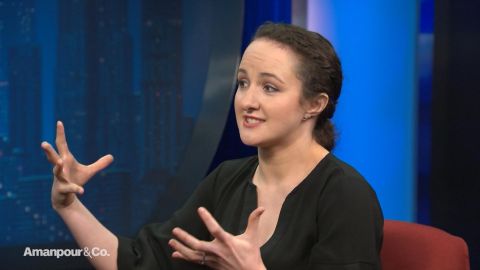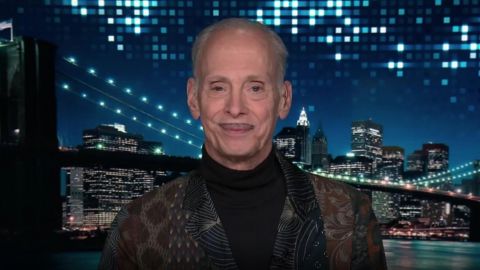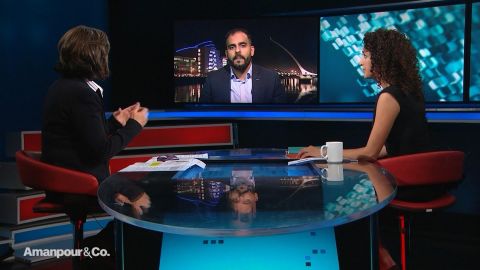Read Transcript EXPAND
CHRISTIANE AMANPOUR: What an amazing impact he’s had. And we remain in the artistic slipstream now with our next guest, the young playwright, and actor Kate Hamill. She became well known for her adaptations of classic novels like Jane Austen’s “Pride and Prejudice.” She’s back with “Little Woman” now off-Broadway in New York. And she sat down with our Alicia Menendez to talk about why the classics are so important, even today.
ALICIA MENENDEZ, CONTRIBUTOR: Kate, thank you so much for joining us.
KATE HAMILL, ACTOR AND PLAYWRIGHT, LITTLE WOMEN: Of course.
MENENDEZ: So, the play you are currently staging is an adaptation of Louisa May Alcott’s “Little Women.” What drew you to this text?
HAMILL: Well, I’m really interested in creating radical feminist reclamations of the classics. And this book is, [13:40:00] you know, I like to think of it as an “Our Town” for American women in that it’s a book that a lot of people have extremely personal connections to. It’s about these almost archetypes of American women and so I was really interested in creating a piece that went, OK, well, how do you deal with becoming a woman in both Louisa May Alcott’s society and today’s society when the world kind of wants you to fit in this teeny tiny box. And so I was very very interested in exploring and exploding all of these archetypes of these four sisters and focusing on what it means if you sort of reject the label of woman altogether and what that means and what it means to be forced into these gender roles.
MENENDEZ: What does it mean to do a radical adaptation?
HAMILL: Well, you know, traditionally, adaptations are sort of copy and paste jobs. That’s not a uniform rule but a lot of people really want to sort of be very faithful to the original.
(BEGIN VIDEO CLIP)
UNIDENTIFIED FEMALE: She nearly killed your half-wit sister.
(END VIDEO CLIP)
HAMILL: I believe in creating something that’s much more surprising and theatrical and embraces the fact that especially in a piece of theater, it doesn’t have to be a museum piece. It doesn’t have to sort of live in this cold marble altar and be a dead thing. It could be living. We can sort of scribble on it with crayon and see what it means now. So, I try to think of it as a collaboration between myself and an author who is currently dead. In this case, it’s Louisa May Alcott so sometimes that means being faithful to the story and sometimes that means quite a radical departure.
MENENDEZ: That’s a big responsibility.
HAMILL: I feel very much like, well, why do this if it’s not trying to make something surprising and new and something that speaks to why we tell these stories today? These stories are cultural touchstones for us, and I feel very much that if we’re not re-examining how these stories shape us, which means re-examining how we shape these stories, why do it?
MENENDEZ: Let’s take a look at a clip from the play.
HAMILL: OK.
(BEGIN VIDEO CLIP)
UNIDENTIFIED FEMALE: It’s not working.
UNIDENTIFIED FEMALE: Of course, it’s not working, you won’t let me get my lines out.
UNIDENTIFIED FEMALE: The problem here is that Amy is not a convincing gentleman and it’s not realistic, then why should we care?
UNIDENTIFIED FEMALE: This is a play about a wizard.
UNIDENTIFIED FEMALE: But in truth strives.
UNIDENTIFIED FEMALE: I could play the gentleman and Amy, Lucella.
UNIDENTIFIED FEMALE: Amy’s too little.
UNIDENTIFIED FEMALE: Oh.
UNIDENTIFIED FEMALE: I regret to inform you, Amy, you are dismissed.
UNIDENTIFIED FEMALE: Dismissed?
UNIDENTIFIED FEMALE: You can’t help who you are, dear. But I shall give you a nonspeaking role, a fairy or a servant.
UNIDENTIFIED FEMALE: A servant?
UNIDENTIFIED FEMALE: A woodland creature.
UNIDENTIFIED FEMALE: You cannot dismiss me because I quit.
(END VIDEO CLIP)
MENENDEZ: What made this adaptation of “Little Women” particularly radical?
HAMILL: Well, I changed the ending. You know, spoiler alert, Jo does not go off and marry a man. She does not give up writing. She’s, as Alcott, and there’s some, you know, you can go back and forth about what Alcott meant by this but Alcott said she was a man’s soul trapped in a woman’s body.
MENENDEZ: Let’s talk about Alcott.
HAMILL: Yes, of course.
MENENDEZ: Because it’s for a classic text, she was, along with Jane Austen, ahead of her time.
HAMILL: Yes. You know, she was — it’s very interesting because she was extremely — she didn’t like “Little Women” very much. It became a huge hit for her but she was very resistant to it but it was very much based on her own family and her own family dynamic and Jo was based on herself.
MENENDEZ: I remember even as a teen reading it and finding her incredibly gender-bending.
HAMILL: Yes, me too. And you know what? In a way, Alcott’s own sexuality and Alcott’s intentions, you know, Alcott was writing for her day and she was a genius. She was so good at creating this sort of witty world, at creating deep, moving relationships, at depicting the epic scale of these seemingly small lives. But I thought, well, if I’m having — writing a play that young people are coming to today, I want them to look on the stage and go, I don’t have to be heterosexual. I don’t have to fit into my gender role. I can be the hero of that story and I can find a way through. I’m open to actor interpretations of where on the spectrum Jo falls. But for me, Jo is not straight.
(BEGIN VIDEO CLIP)
UNIDENTIFIED FEMALE: Here I am, Meg.
(END VIDEO CLIP)
HAMILL: Jo is someone who’s growing up without role models to whom she could — who would help her define herself. But I believe nowadays Jo would be maybe gender queer or non-binary or even trans. I feel like that’s the natural next progression of this character and what I wanted to show young people. LGBTQ kids are five times more likely than the general population to commit suicide, to suffer depression, to be kicked out of their homes. I really wanted to create a story that’s about, it is not wrong to be who you are. You can be who you are and you may get pushback for it but things are going to turn out for you. And I did not want it to end with, isn’t it wonderful, you’ll — you know, eventually realize you don’t want to be a writer after all and you’ll go off and give up your dreams and marry a man. There’s nothing wrong with marrying a man. I’m marrying a man. But I really hate when those are the only stories our young people are being told and particularly our young girls are given so much messaging that romantic love is sort of the point of life. And you know, that’s — I can remember being a little child and sort of feeling like, oh, you know, four or five and feeling like after you get married, life sort of ends in a happy way, you ride off into the sunset. And I just — that just drives me crazy because I think it has so many lasting repercussions on women’s ambitions and what women do in the world.
MENENDEZ: I mean this is not the first classic that you have adapted.
HAMILL: No.
MENENDEZ: A lot of your other award-winning work, adaptations of “Pride and Prejudice”, “Vanity Fair,” “Sense and Sensibility”. Why not write and adopt more modern plays?
HAMILL: Well, I do modern work as well. I’m developing something right now called “The Piper” which is about essentially a cult and how cult thinking enables toxic masculinity. But it’s especially important to me to create new feminist classics because you know, again, these stories are things we teach in our schools. They are stories that shape us culturally. They are stories that we refer to again and again. They’re stories that we look to for archetypes. And so when these stories are always male-dominated or indeed told through the male gaze, we’re losing the sense of female-driven narratives. So often, women are expected to be tertiary in storylines, sort of the wife, the girlfriend, the prostitute. There are great roles for wives and girlfriends and prostitutes but when you’re never the hero of your own story, I think that has ramifications culturally. I think that’s part of why it takes 20, 30 accusers to bring down 1 man who’s a serial sexual predator because we’re so used to thinking of women as the other. And so, it’s really important to me to make these classic stories which we’d use to teach our children stories and also to teach these universal stories which are supposed to speak to all of us to make sure that they speak to people of all gender and expressions that are inclusive.
MENENDEZ: There’s a note in the script that I wanted to ask you about where you write, “Little Women” must, all caps, be cast in an inclusive fashion, it’s an American play and should reflect America today, particularly the March family.”
HAMILL: Yes.
MENENDEZ: Why that note? I mean do you need to put that note in the text to help people get it?
HAMILL: I do need to put that note in the text because otherwise, they tend to want to cast it with all white people. And for me, first of all, I, as an adapter, am someone who believes very much like I don’t — the wonderful thing about theater is it doesn’t have to be like film or the movies. It doesn’t have to be drama tragically. It doesn’t have to be purely realistic. People can play animals. People can play different characters. Adults can play children. But it’s — again, it comes back to it’s so important that people be able to see themselves in the classics and everyone across that makes up America be able to see themselves in the classics and not feel like that doesn’t — that’s not for me, that doesn’t include me. And I think it’s important for us to embrace, like, how America looks when we’re putting American women on the stage.
MENENDEZ: To that point, I want to take another look at another clip from the play.
HAMILL: Of course.
(BEGIN VIDEO CLIP)
UNIDENTIFIED FEMALE: And then, just then, like she sensed it. Daisy woke up and started wailing and that woke Debbie and he started wailing. And then I should have gone and picked them up but I just couldn’t, I started wailing. And that’s how John found me, crying and covered with jam with the babies screaming in their nursery.
UNIDENTIFIED FEMALE: Oh.
UNIDENTIFIED FEMALE: And then John asked me why I hadn’t picked up the babies and I cried. And he asked me why I hadn’t made dinner and I cried. And he asked me why I was so messy and I cried. And then he called me hysterical and I said, hysterical is just what men call women who bear and bear what men never could and finally snap.
(END VIDEO CLIP)
MENENDEZ: That must be so satisfying to deliver.
HAMILL: It really is. You know, and it does get applause most nights and I think it’s because it’s so — it’s still true, that women are really expected to fit in these tiny boxes of acceptable behavior which are impossible. No one can be that perfect. And I wrote this speech based on friends of mine who are mothers who feel very — who have, at various points, in their lives, felt very much like you’re punished for everything. You’re punished for being at home, for not being at home. It’s just very hard to reconcile the demands society puts on women and especially mothers. It’s just still very, very true.
MENENDEZ: There was a note in the script that stood out to me. You write, of the characters, they are not always perfectly likable and that’s particularly important for young women, the freedom not to be likable at all times but they are perfectly human. Why is that gender expectation, which is so subtle sometimes, so pernicious?
HAMILL: You know I would argue it goes back again to the primacy of the male gaze. If women are always tertiary, if they don’t feel like they can be the heroes of their own story, of course, they feel like there’s such a premium put on likability because you are trying to appeal to the male gaze. And what I found working, you know, having my place produced around and working especially with young actresses, is women are given notes like, well, I don’t, you know, sort of like your character. But men can play mass murderers. Men playing Macbeth and — are not getting those notes because women are expected to stand in for their entire gender and men are allowed to be human beings. And so I find such freedom in allowing characters to be fallible.
MENENDEZ: And what is the response from male audience members?
HAMILL: You know what’s fascinating is I was — I think when I started out, I was expecting a more defensive response. But it’s been so open- minded and lovely and people getting invested in stories that they thought was, you know, sort of chick literature or chick stories. What was important to me was creating feminist stories that also show how, frankly, the patriarchy also affects male lives and how toxic masculinity oppresses men. And it’s been fascinating to see men really respond to these stories that before they kind of felt like, well, that’s not for me. And you know, men do come to my shows and I’m super heartened by it.
MENENDEZ: The next play that you’re Adapting, “Dracula”.
HAMILL: Yes.
MENENDEZ: Why that story?
HAMILL: Well, it’s very interesting. “Dracula,” a classic stage company, I’m doing “Dracula” with them in the winter and it’s a very problematic novel. It’s incredibly sexist. I write little notes in the margins and the thing I kept writing was, yikes, because it is sexist. But you can’t deny the kind of stranglehold it has in our culture. And I thought, oh, wouldn’t it be fascinating to do a feminist reclamation of this, to be like, OK, who are the vampires in our culture right now? What does that mean, to be a vampire? What does it mean to fight vampirism? So I’m working on that right now and I also like flexing my muscle in the darker stuff, so it’s fun for me.
MENENDEZ: Are there any texts that are off limits?
HAMILL: No.
MENENDEZ: Moby Dick, the Bible?
HAMILL: Yes. I sort of would do either of those. I feel like if we’re still talking about it, it’s worth re-examining. There was a reviewer who didn’t like me very much and when the cities were one of my plays who said, is no classic safe from Kate Hamill? And I was sort of like, well, no. I’m not proposing burning the books. They’re still out there. But why not do something surprising or interesting?
MENENDEZ: Kate, thank you so much.
HAMILL: Thank you so much.
About This Episode EXPAND
Christiane Amanpour speaks with Maya Foa and Ibrahim Halawa about Egypt’s mass trials and death sentences; and John Waters about his new memoir “Mr. Know-It-All.” Alicia Menendez speaks with Kate Hamill about “Little Women.”
LEARN MORE


